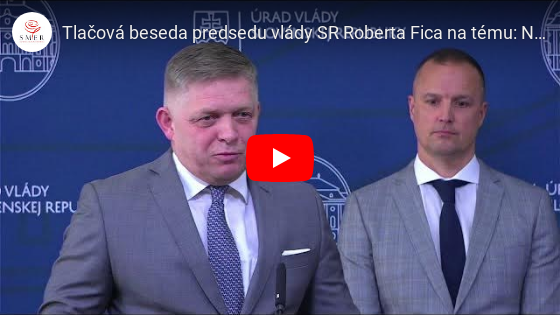Premier Robert Fico (Smer) has called on Ivan Fiačan, the chief justice of the Constitutional Court, to resign. He cited the reason to be the ‘anti-government’ media reporting on last week’s decision on suspending key parts of the government’s amendment to criminal laws earlier than the decision's delivery to the Justice Ministry, the president and the opposition parties involved in the legal disputes.
“If I had the competence, I’d dismiss him,” Fico announced during a press conference on Tuesday.
The briefing was attended by his advisor and former judge Dávid Lindtner, who is facing a corruption charge and helped co-write the amendment in question, another advisor and prominent lawyer Marek Para, Smer’s defence minister Robert Kaliňák, and the charged Smer MP Tibor Gašpar.
Fico went on to say that the new Slovak president, who will be elected in early April, should handle Fiačan’s dismissal.
The president appoints or dismisses the chair of the Constitutional Court (the chair still remains to serve as the Constitutional Court judge), according to the constitution. The constitution does not mention any further detail. The law on the Constitutional Court mentions that the panel of the Constitutional Court can submit a proposal to the president to remove the chair from the position.
According to the Council of Europe’s Venice Commission, the president should not dismiss the chair “at any time and without objective reasons”. The commission said this in 2014 when President Andrej Kiska wanted to dismiss the then chair Ivetta Macejková.
Presently the polls indicate a win by Hlas party leader and Speaker of Parliament, Peter Pellegrini, in the presidential race. Smer, which forms a ruling coalition with Hlas and SNS, supports Pellegrini.
Deadline for the court considered
During the press conference, Fico reiterated that he respects the court’s decision, and again stressed that Smer has achieved its political goal: the abolition of the anti-corruption Special Prosecutor’s Office as of March 20. At the same time, he criticised the Constitutional Court for deciding on a law that wasn’t published in the collection of laws, when the court was dealing with the president and the opposition’s submissions.
"Under what kind of political pressure was the Constitutional Court forced to take such hurried action?" he asked, as quoted by the TASR news agency.
The court’s decision will be published by the Justice Ministry in the collection of laws in time to become effective, Fico said.
He called on the court to quickly decide on the constitutionality of the suspended parts. There is no deadline for the court, though. Fico admitted that his government may introduce deadlines for the court when deciding on important cases. Today, the court has, for example, 60 days to decide on the constitutionality of referendum questions.
According to Fico, the government will also prepare another amendment to the Penal Code in the near future. It will include ‘useful items’ that the court should have no problem with, according to Fico. One such item could concern penalties and the criminal damage classification.
Fico compared to dictator
The opposition has slammed Fico for threatening Fiačan, writes TASR.
“We consider Robert Fico’s attacks on the Constitutional Court to be unacceptable and absurd,” said SaS MP Branislav Gröhling, noting that 11 of the 12 judges, including Fiačan, were elected during the previous Smer government.
According to ex-PM and presidential candidate Igor Matovič (Slovensko), Fico despises the court. Only dictators do that, he said.
KDH recommended the government to acknowledge the deficiencies of the amendment.
Fiačan responds to Fico
Fiačan assured during the press conference on Wednesday that he and the judges act autonomously, impartially and do not act under pressure.
He also apologised for leaking information about the decision of the Constitutional Court. According to him, the information should not have leaked, but he does not consider it a reason to resign.
“I’m sorry, we were surprised by it ourselves, I apologise. But I’m sure that none of the judges did it. It’s a mystery to us too,” said Fiačan.
Fiačan established an internal investigation team to analyse possible ways of leaking this information.
According to Fiačan, the decision of the Constitutional Court reflects the public interest, therefore it has every right to inform the public immediately after its decision and is not obliged to wait for its delivery to the participants in the proceedings.
Fiačan also does not understand why the government is attacking the integrity and independence of judges of the Constitutional Court.
“I don't remember in the history of the Constitutional Court any of the highest constitutional officials expressing themselves in this way to the Constitutional Court,” said Fiačan. “I hope it won’t happen again.”
In the 1990s, Prime Minister Vladimír Mečiar described the Constitutional Court as a "sick" element in Slovakia. Former chair Ján Mazák (2000-2006), however, points out that other politicians attacked the court in the past, too.
“In one decision, we bequeathed President Rudolf Schuster a ban on appointing Štefan Harabin as chair of the Supreme Court. I was a member of this senate, and then the president of the republic declared that I should be dismissed and wanted to dismiss me. But in the end, he understood we are acting in accordance with the Constitution,” Mazák told the HN daily.
In 2019, Fiačan and Fico both wanted to become the chair of the Constitutional Court. The then Slovak president Andrej Kiska appointed Fiačan. Fico withdrew.
The Constitutional Court should decide whether the examined material is unconstitutional within a few weeks. If it is a matter of months, Judge Peter Straka has said that he is ready to propose cancelling the suspension of at least part of the provisions.


 PM Robert Fico during a press conference on March 5, 2024. (source: TASR)
PM Robert Fico during a press conference on March 5, 2024. (source: TASR)
